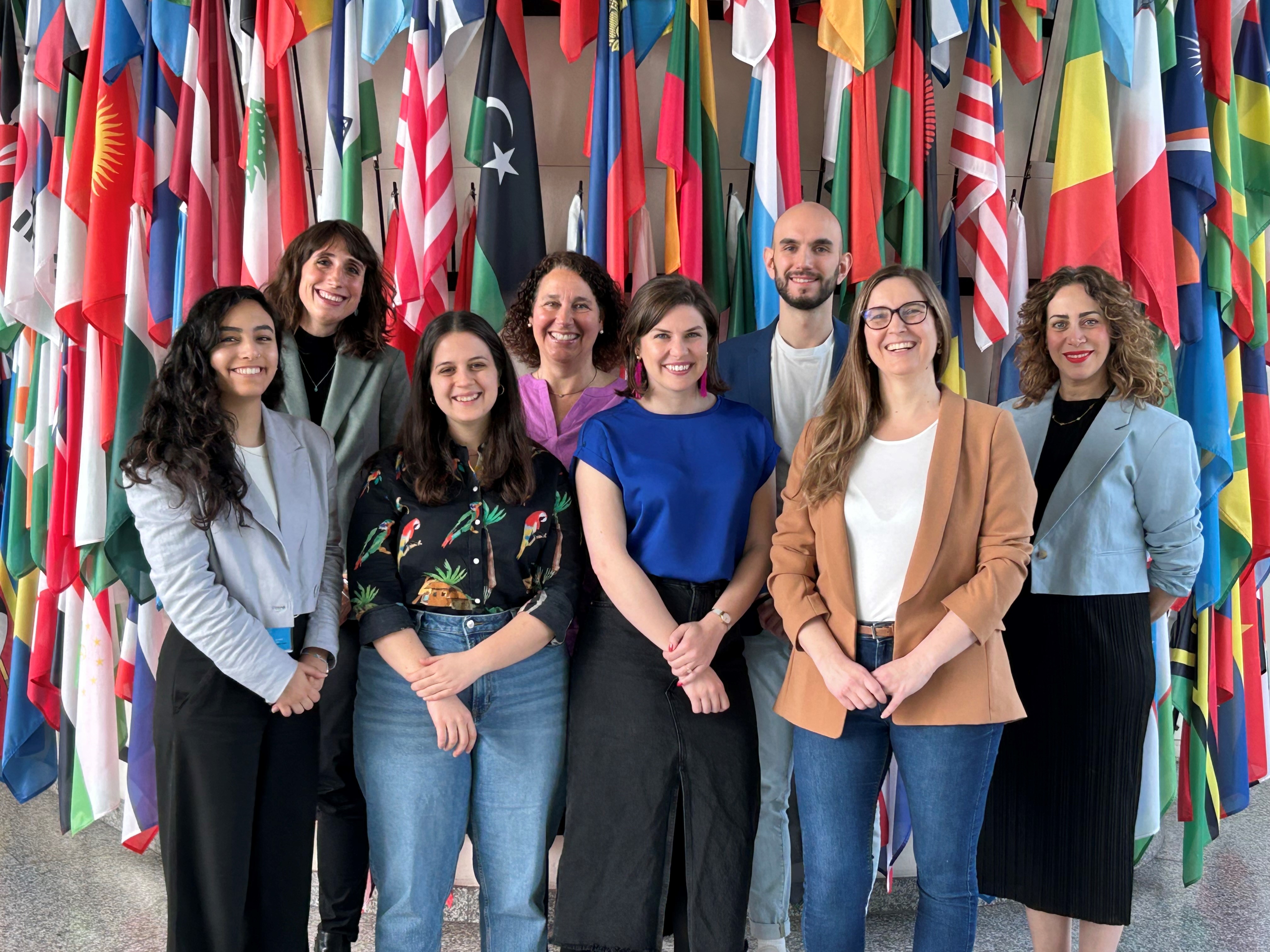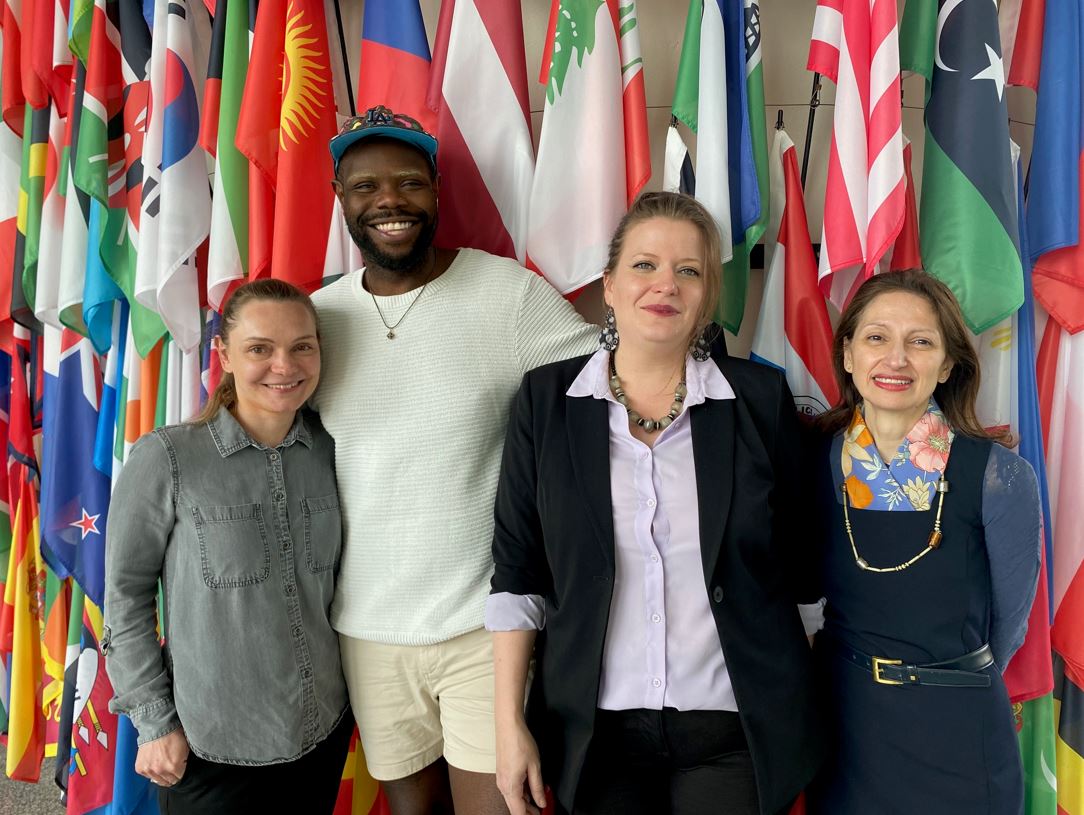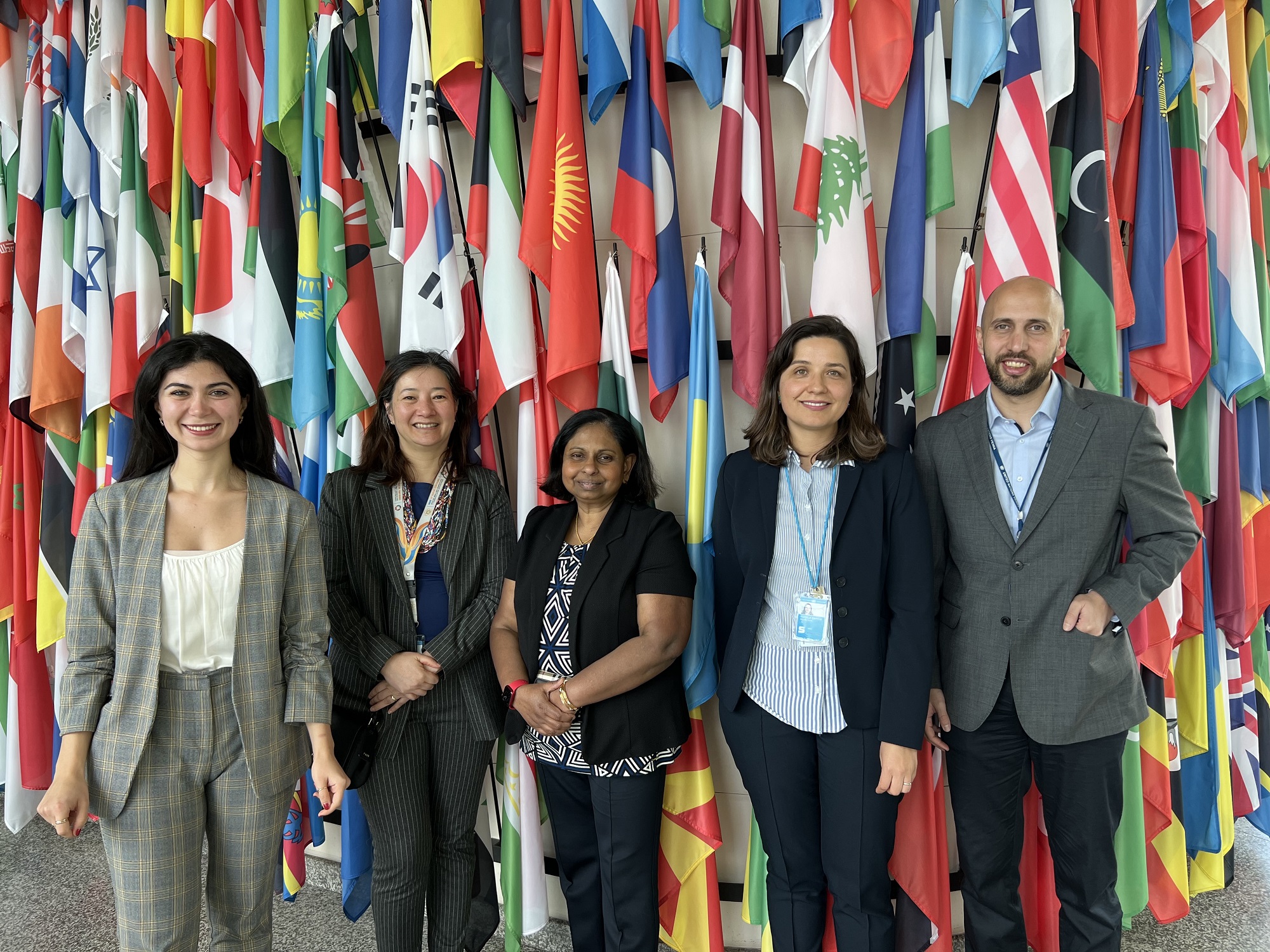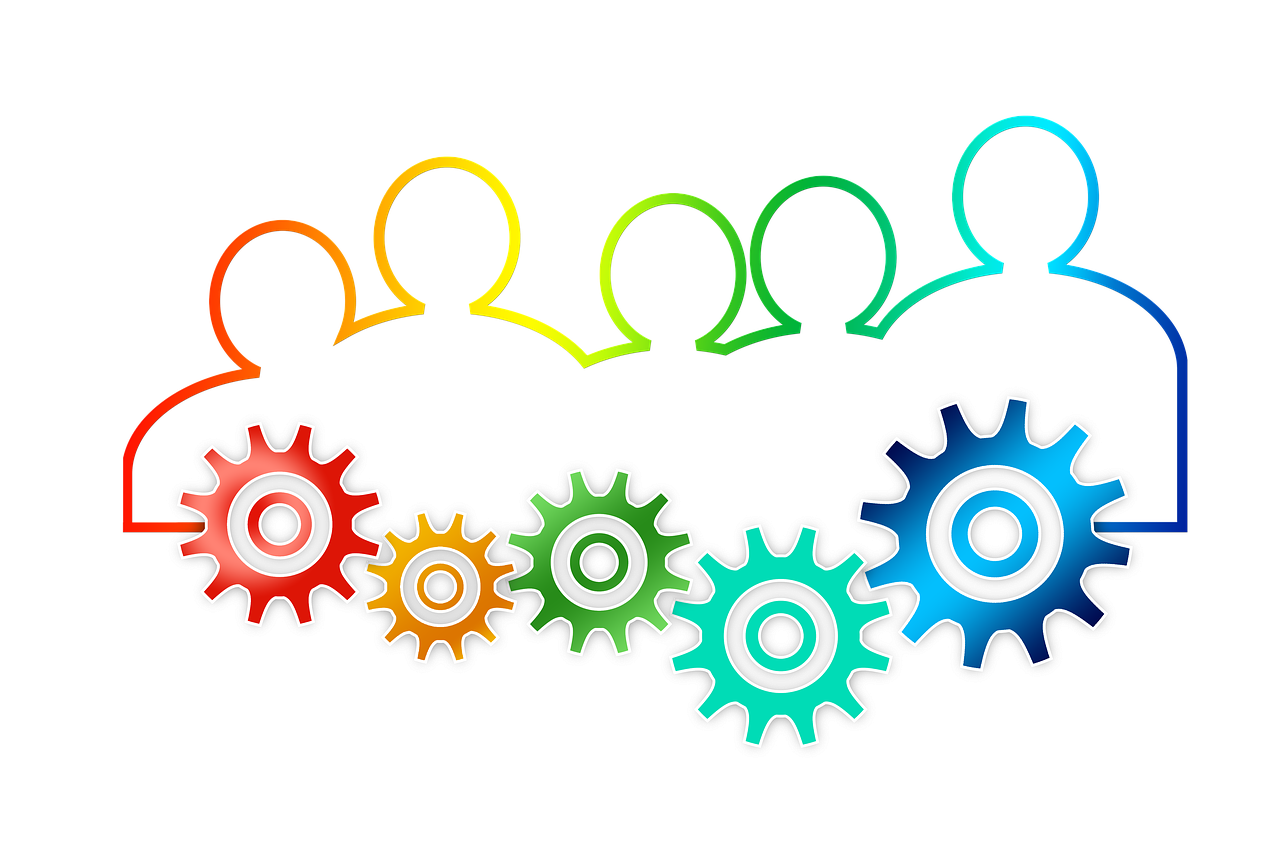Current or former contributing members not pictured: Ebrar Atalay, Irina Berezina, Patricia Bliem, Sofia Ferrara, Marta Fernandez de Mazarambroz, Monroe France, Helen Galkan, Matin Gasimzade, Patience Gebauer, Anna Giudice, Alexander Guglia, Jakub Michal Kiedrowski, Matthias Lademann, Nancy Macharia, Marija Maslova, Megan McAdams, Sarty Nghixulifwa, Anna Pfeiffer, Beatrice Predescu, Serina Satti, Sara Sorger, Gerhard Tripp, Yiran Xu, Emmi Ylinen.
At the 2022 UN-SWAP Annual Conference, IAEA, representing the Vienna-based UN Organizations (VBOs) showcased the inter-agency Dignity and Inclusion Learning Initiative (D&I initiative), which was voted as one of the two initiatives to be prioritized for cross-entity adoption.
In this interview, Rachel Loper, Gender Equality Officer of IAEA and the VBO working group shared how entities based in the location pool resources together and take a ‘One UN’ approach in delivering the D&I initiative with more than 1,000 participants up to now. They're also willing to support other UN entities launching the similar initiatives.
The initiative is jointly implemented by: CTBTO, IAEA, UNIDO, and UNOV/UNODC.
Why did VBOs choose to develop an initiative on this topic? What are the needs it seeks to solve?
As we know, meaningful representation matters, particularly when it comes to issues of global importance such as the achievement of the Sustainable Development Goals. There is ample evidence that diversity in leadership and within teams is correlated with improved decision-making, better problem solving, creativity, and enhanced productivity. It even seems to be linked to more pro-environmental behaviour. This means that Dignity and Inclusion is an essential topic to the functioning of the UN as regards the rights and well-being of personnel, but also for ensuring effective and efficient delivery of results in the implementation of our mandates.
In line with our core value of Respect for Diversity and as we advance our efforts towards a diverse workforce and an enabling workplace environment, questions of diversity and inclusion go beyond gender. The world is increasingly recognizing the impact of individuals’ various social and political identities on their experience of privilege or discrimination inside and outside of the workplace. To ensure that our personnel have a basic understanding of some of these elements of identity, we have used this series to broaden the scope of our capacity-building activities and take a much stronger intersectional approach.
We believe this resonates not only with the personnel of CTBTO, IAEA, UNIDO, and UNOV/UNODC - the Vienna-based UN Organizations (VBOs) - but also with the UN-SWAP network.
Can you briefly introduce this initiative?
Recognizing that we have shared core values and were individually working on similar issues, we have decided to pool our resources together and take a ‘One UN’ approach to capacity-building on the topic of dignity and inclusion.
Working together resulted in being able to offer more for all Vienna-based Organizations' personnel, providing trainings on more topics than we would have been able to individually. Through this joint process, we now have a VBO-wide working group that allows us to share resources to continue offering all existing modules and develop new ones, further increasing the impact of our shared capacity-building activities.
Topics covered in this series currently include:
- Building Resilience;
- Addressing Racism;
- Boosting Your Motivation;
- Disability Inclusion and Accessibility Awareness;
- Harassment Prevention;
- Substance Use and the Workplace;
- Empowering Active Bystander;
- LGBTIQ+ Inclusion;
- Cross-Cultural Communication;
- Promoting Staff Wellbeing.
Why is the D&I initiative so important in VBOs, i.e. CTBTO, IAEA, UNIDO, and UNOV/UNODC? In your view, what’s the role of the gender component in this initiative?
Aside from sharing resources to increase outreach, the importance of the D&I initiative relates especially to its intersectional value to all VBOs. While gender is a central element of many of the modules of this series, our intersectional approach ensures that the modules connect and resonate with individual participants at various personal levels. In expanding the scope of these discussions beyond gender, we can engage with personnel not otherwise interested in gender equality and dispel any ideas that gender is the only part of identity that matters regarding inclusion. Throughout the series, we encourage our participants to consider issues from a new perspective and challenge them to question their assumptions. As such, the series provides an opportunity to showcase overlapping aspects of various issues and build bridges for empathy as a path to more inclusive behaviour.
Can you describe how you collaborate among Vienna-based organizations to roll out this initiative?
Colleagues from CTBTO, IAEA, UNIDO, and UNOV/UNODC specialized in Gender Equality, Diversity & Inclusion and Learning & Development, as well as Staff Counsellors and representatives of the respective Human Resources and Ethics units collaborated to identify needs and available resources. Together, existing trainings were adjusted, and new ones were developed. This working group also developed a central website with information about the various training modules where registration details and resources are updated and shared. The working group convenes on a regular basis to guarantee comprehensive member updates and organizational alignment with the rollout of new and continued facilitation of existing modules.
If needed, external experts have been brought in to (co-)facilitate, but typically the bulk of these sessions are led by internal facilitators. The facilitating teams are composed of personnel members from various Vienna-based Organizations, as often as possible in facilitation teams representing more than one Organization to keep in line with the spirit of the initiative.
Having diverse facilitators in terms of organizational background has also proven to be valuable when participants ask specific questions on the internal policies of their organization. If one of the facilitators is not able to answer a specific policy question, they are at least able to direct them to the right person who would be able to handle any specific queries.
If other entities/duty stations want to come on board with you, where should they start? Any cost/resources expected?
Since its launch in November 2021, the VBOs’ Dignity and Inclusion Learning Initiative has drawn more than 1,000 attendees – personnel continue to express their interest through feedback forms and content is regularly adjusted to serve the needs of all personnel. The cooperation between the different VBOs has been an enriching experience. We support other UN entities launching similar initiatives.
The main cost has been personnel time, but in some cases where external facilitators were engaged, funding was required as well. This would vary based on the existing capacity of whichever organizations were interested in starting a similar initiative.
We are happy to share our resources and insights with interested entities! We would suggest first carrying out a needs assessment of personnel, followed by getting an overview of existing training materials and resources. We recommend contacting other organizations that might already have well-developed and tested training. This was also a crucial step in our approach and we wouldn’t have been able to develop the initiative in its form without the insights and resources from other UN entities.
With thanks to the VBO D&I Learning Initiative Working Group and Facilitators

Back row left to right: Claudia Carpanese, Andrea Kienle, Nicolas Schmidt, Alya Faris-Elmorsy
Front row left to right: Lama Lafi, Katharina Fuernkranz, Rachel Loper, Neva Badalamente

Left to right: Katarina Posa, Stephane Magloire, Aurelie De Gournay

Left to right: Deniz Iskendarova, Ana Paula Nishio de Sousa, Hemamali Kularatne, Daniela Tudela, Mahmoud Abou Saman

Johanna Schubert
